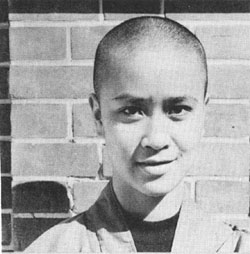|
Material success and fame came very
quickly. And with it a deeper sense of pending decay and death. The illusory
nature of the entertainment world intensified her insight into the ephemerality
of all dharmas with marks.
Egged on by a curious urgency, she left
abruptly to return to America. The causes and conditions were ripening. In May
1977 she met the Venerable Abbot Hua at Gold Mountain Monastery. Awed by the
immense purple and golden light that streamed from the Abbot's halo, her heart
became constantly flooded with images of the Venerable One. This time she knew
there was going to be no escape.
On reading the Buddhist texts, she was
struck again and again by the description of certain states therein; they
corresponded exactly to many visions and dreams she had had since childhood.
When the woodcut illustrations of the Forty-two Hands were shown her the first
time, her heart trembled with delight.
The mesmerizing words of the Great
Compassion Mantra produced a similar effect: have we all forgotten our original
heritage, a collective universe whose scope is larger than anything we can ever
imagine?
After this, leaving home was easy.
Kuo-jing's
head was shaved on August 10, 1977. At present she lives at the International
Institute for the Translation of Buddhist Texts, cultivating along with her
peers in the Dharmas. She is transcribing and editing the Surangama Sutra
together with the Venerable Master's commentary in Chinese.
She says, "The present Avatamsaka
Assembly at Gold Mountain is the most wondrous experience. Day by day the sutra
expands in its multi-faceted jewel spheres. Nobody ever excelled the Buddha in
eloquence and compassion. Just image: the states of inter-penetrating wisdom and
transformation, all realized within ineffable, Ineffable Buddha-lands, numerous
dust-motes. Isn't that just too wonderful for words?"
AVAILABLE
IN 1977;
THE WONDERFUL DHARMA LOTUS FLOWER SUTRA
INTRODUCTION, an 88 page volume which introduces the 25 chapters of this profound
Great Vehicle sutra "for realizing Buddhahood." The Venerable Master's
commentary elucidates the transcendental principles of this important text.
Available in November from BTTS.
|
